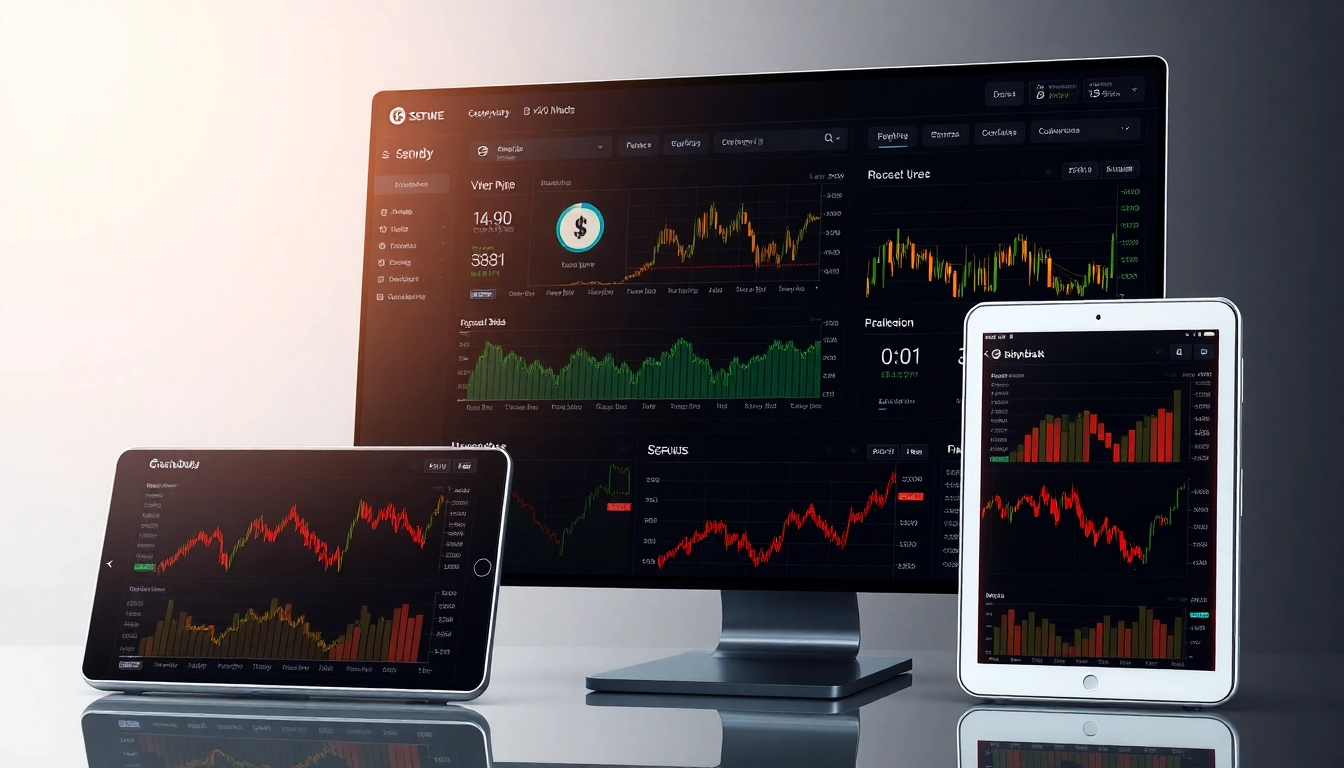Introduction to Online Trading UK: Opportunities and Challenges
Online trading in the United Kingdom has revolutionized how individual investors and traders participate in financial markets. With technological advancements, regulatory clarity, and an expanding array of platforms, the UK market offers a dynamic environment for both beginners and seasoned traders. Whether you aim to invest in equities, forex, commodities, or CFDs, understanding the nuances of the UK trading landscape is crucial for success. If you’re exploring the potential of this vibrant market, it’s essential to grasp key regulatory frameworks, choose the right trading platform, and develop strategies tailored to the UK environment. Dive into the world of Online Trading UK to unlock your investment potential with confidence.
Understanding the UK Trading Market Landscape
The UK boasts one of the world’s most sophisticated and accessible financial markets. The London Stock Exchange (LSE) is among the largest stock exchanges globally, providing access to a broad array of UK and international equities, ETFs, and fixed income securities. Additionally, the UK’s forex market is highly active, supported by numerous brokers offering leverage, advanced trading tools, and real-time data.
The market’s diversity includes retail trading platforms, institutional investment channels, derivatives, and alternative investments. This ecosystem supports a wide array of trading styles—from day trading and swing trading to long-term investing. The rise of fintech solutions has further democratized access, allowing retail traders to partake in sophisticated strategies traditionally reserved for professionals.
Emerging sectors like green energy, technology, and biotech are attracting increased investor interest, reshaping the UK market landscape. In addition, the availability of fractional shares and commission-free trading platforms like Trading 212 has lowered barriers to entry, enabling newcomers to start investing with minimal capital.
Key Regulations and Compliance Requirements
Regulatory oversight is a cornerstone of the UK trading environment. The Financial Conduct Authority (FCA) is the primary regulator, responsible for ensuring market integrity, protecting consumers, and maintaining fair trading practices. FCA regulation mandates strict compliance with capital adequacy, client fund segregation, transparency, and anti-money laundering protocols.
For traders, operating through FCA-licensed brokers offers peace of mind, knowing their assets and personal data are protected. Brokers like IG, Interactive Brokers, and Freetrade are FCA authorized, adhering to rigorous standards. It’s vital for traders to verify a platform’s regulatory status before depositing funds or executing trades.
Additionally, the UK’s regulatory environment is evolving, with updates affecting leverage limits, disclosure requirements, and market conduct rules. Staying informed through official FCA communications and industry news can help traders remain compliant while optimizing their strategies.
Common Obstacles Faced by UK Traders and How to Overcome Them
Despite the opportunities, UK traders encounter several challenges, including high market volatility, complex regulations, and sometimes overwhelming platform choices. Fear of making costly mistakes or misunderstandings of trading mechanics can hinder progress.
To mitigate these obstacles:
- Education is key: Enroll in reputable trading courses (e.g., London Academy of Trading) or utilize demo accounts on platforms like Trading 212 to build confidence without risking real money.
- Stay informed about regulation: Regularly consult FCA updates to understand compliance requirements and leverage legal protections.
- Opt for regulated platforms: Use FCA-authorized brokers to safeguard your funds and ensure fair trading conditions.
- Implement robust risk management: Utilize stop-loss orders, diversify your portfolio, and avoid over-leverage to reduce potential losses during volatile market swings.
- Leverage data-driven strategies: Employ technical and fundamental analysis to inform your trades, aligning with market conditions and your risk profile.
By proactively addressing these challenges, traders can navigate the complexities of the UK market more effectively and build sustainable trading habits.
Choosing the Right Online Trading Platform in the UK
Features to Consider: Fees, Usability, and Tools
Selecting the optimal trading platform hinges on several factors. Cost is paramount—focus on platforms with transparent fee structures, including commissions, spreads, withdrawal fees, and inactivity charges. For example, platforms like Freetrade offer commission-free trading, while others like Interactive Brokers provide low-cost trading for active investors.
Usability encompasses user interface design, ease of navigation, and customer support. A user-friendly platform minimizes errors and enhances the trading experience. Advanced traders might prioritize customizable dashboards, real-time alerts, and API access for automation.
Tools and analysis capabilities are essential for developing and executing strategies. Robust charting features, technical indicators, news feeds, and educational resources distinguish top platforms. For instance, IG offers comprehensive research and technical analysis tools, catering to more experienced traders.
Comparison of Top UK Trading Platforms in 2025
Based on recent assessments, several platforms stand out in the UK market:
- Trading 212: Best for beginners due to its simple interface, fractional shares, and commission-free trades.
- Interactive Brokers: Ideal for experienced traders seeking low-cost, global access, and advanced tools.
- Freetrade: Zero commission stock trading with an intuitive app, suitable for casual investors and mobile traders.
- eToro: Combines social trading with copy trading features, offering diversification across stocks, cryptocurrencies, and ETFs.
- Degiro: Noted for ultra-low trading fees, especially appealing to active traders dealing in high volumes or multiple asset classes.
Evaluating these options involves analyzing fees, available assets, platform stability, and customer reviews. Matching platform features to your trading style ensures a more efficient and satisfying experience.
How to Evaluate Security and Regulatory Compliance of Platforms
Security is paramount when trading online. Ensure the platform employs advanced encryption, two-factor authentication, and regular security audits. FCA authorization is a reliable indicator of compliance, transparency, and consumer protection.
Test the platform’s responsiveness, order execution speed, and customer support quality before committing significant funds. Read user reviews, check regulatory disclosures, and verify insurance schemes such as SIPC or FSCS coverage, which provide additional funds protection in case of broker insolvency.
Developing Effective Trading Strategies for the UK Market
Fundamental vs. Technical Analysis for UK Stocks
Fundamental analysis involves evaluating the financial health, earnings, and growth prospects of UK companies. It suits investors with a long-term horizon seeking value or dividend income. Key metrics include P/E ratios, earnings per share, and macroeconomic factors like Brexit impacts or UK fiscal policies.
Technical analysis focuses on price patterns, volume, and indicators like moving averages or RSI to predict short-term price movements. Day traders and swing traders often rely on technical tools, especially in highly liquid UK stocks or indices like the FTSE 100.
Blending both approaches can yield resilient strategies, balancing valuation insights with momentum trends.
Risk Management Techniques Tailored for UK Traders
Managing risk involves setting appropriate stop-loss and take-profit levels, diversifying across sectors, and controlling leverage use. In volatile markets, strict risk limits prevent catastrophic losses.
Utilize position sizing techniques like the 1-2% rule, keeping individual trades within a manageable risk threshold. Regularly review and adapt your risk parameters according to market conditions and personal capital growth.
Remember, emotional discipline and adhering to a trading plan are crucial risk mitigation tools that reduce impulsive decisions and losses.
Implementing Automation and Trading Bots in UK Online Trading
Automation introduces efficiency, silence emotional biases, and enables round-the-clock trading in markets like forex and CFDs. The UK offers various trading platforms with built-in algorithmic tools or integration with third-party APIs.
Developing or deploying trading bots requires programming skills or using platforms with visual scripting. Ensure robust testing via demo accounts before live deployment. Continual monitoring and adjustment of algorithms are essential to adapt to changing market dynamics and avoid unexpected losses.
Maximizing Investment Returns in UK Equity, Forex, and CFDs
Best Practices for Trading UK Stocks and ETFs
Investing in UK stocks and ETFs demands diligence. Focus on companies with strong fundamentals, resilient cash flows, and growth prospects. Use limit orders to control entry points and monitor market news for sector shifts.
For ETFs, consider low-cost index funds that offer diversification and passive income. Regularly rebalance your portfolio according to performance and risk appetite to maintain optimal allocation.
Leveraging Forex Trading Opportunities in the UK
The UK is a major forex hub, with significant liquidity in currency pairs like GBP/USD and EUR/GBP. Use technical analysis to identify entry and exit points, and stay aware of macroeconomic releases such as Bank of England policies or Brexit negotiations.
Leverage can amplify gains but also magnify losses—use it cautiously. Implement strict risk management and consider trading during peak hours to maximize liquidity and reduce spreads.
Using CFDs to Diversify and Hedge Your Portfolio
Contracts for Difference (CFDs) enable exposure to a broad range of assets without owning the underlying instruments. They are useful for hedging existing positions or gaining leveraged access to UK indices, commodities, and foreign currencies.
Due to their leveraged nature, CFDs carry higher risk. Always employ stop-loss orders and avoid over-leverage. Understand the specific terms and costs associated with each CFD provider to ensure transparency and risk control.
Staying Compliant and Improving Performance
Regulatory Updates Affecting UK Online Traders
The UK regulatory landscape is continually evolving. Recent updates include leverage restrictions for retail traders, enhanced disclosure requirements, and stricter advertising standards. These changes aim to protect investors but also necessitate ongoing vigilance and adaptation.
Staying connected with FCA announcements, industry news, and participating in trader communities can keep you informed about regulatory developments that may impact your trading approach.
Monitoring and Analyzing Trading Performance Metrics
Tracking key performance indicators (KPIs) like win rate, profit factor, drawdowns, and return on investment is vital for refining your strategies. Use analytics tools provided by trading platforms or third-party software to conduct detailed reviews.
Regular performance assessments facilitate data-driven decision-making, identify weaknesses, and underscore successful tactics, thereby fostering consistent improvement.
Continuing Education and Resources for UK Traders
Continual learning is the backbone of successful trading. Leverage online courses, webinars, and industry reports. The London Academy of Trading offers extensive online courses tailored to UK traders, from beginner basics to advanced strategies.
Additionally, subscribing to financial news outlets, participating in trading forums, and practicing on demo accounts elevate your skills and keep you abreast of market trends. Staying informed and educated ensures adaptability and ongoing growth in the competitive landscape of online trading.



